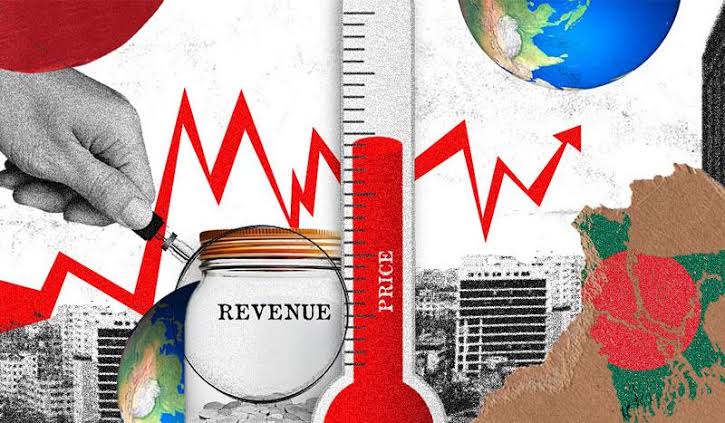01/30/2026

Bangladesh economy falters; growth slows, factories shut, jobs lost
Special Correspondent | Published: 2025-06-17 16:34:47

Bangladesh’s economy is under growing pressure as GDP growth slows, foreign investment declines and unemployment rises, raising concerns among economists and industry insiders that the economy could face long-term instability without urgent reforms.
According to the latest World Bank report, GDP growth for the current fiscal year may drop to 3.3 percent, the lowest in two decades.
At the same time, the Ministry of Finance reports that foreign investment fell by over 70 percent in the first six months of FY2024-25.
The World Bank’s April publication ‘Bangladesh Development Update’ warns that by 2025, an additional 3 million people may fall into poverty, driven by weak investment and growing internal challenges.
Dr Anu Muhammad, a former professor of economics at Jahangirnagar University, said public frustration is rising due to prolonged economic difficulties.
“After the fall of the Awami League, many corrupt business groups and money launderers fled. That was a major opportunity to restructure the economy, but it was missed. The same pattern of economic management continues, and it has yielded no positive results,” he said.
Industrial Police data shows nearly 100 factories in Gazipur, Narayanganj-Narsingdi and Savar-Dhamrai have shut down permanently, leaving more than 60,000 workers unemployed.
Investigations reveal that many investors during the Awami League regime are now in jail, have gone into hiding or fled the country. Due to lack of funds and fewer purchase orders, these factories were forced to cease operations.
“More than a hundred factory closures have rendered hundreds of thousands unemployed,” Dr Anu Muhammad added. “Many who fled after closing factories had enjoyed undue privileges during the previous government. While the beneficiaries should be held accountable, not ensuring alternatives for the workers shows poor judgement. This will have a direct impact on the economy.”
Instead of focusing on increasing national capacity, the proposed national budget appears to raise dependence on imports. Ignoring domestic industries and relying on foreign imports will deepen the crisis, the economist observed.
Cash flow continues to decline in factories still in operation, coupled with an energy crisis. Shortages in fuel supply relative to demand and limited bank financing are bringing uncertainty to the industrial sector.
Ashraf Ahmed, Director of the Dhaka Chamber of Commerce and Industry (DCCI), said, “Running factories with imported LNG are becoming extremely difficult. Most factories are suffering due to fuel shortages. When production drops, the economy suffers directly. From 2012 to 2022, private sector credit flow was strong. Now that flow has weakened. Factory owners have no capital, production has stalled, workers are not getting paid, and the economy is spiralling into disorder.”
He added, “Although law and order has improved somewhat, other sectors remain unstable. Many banks are now so weak they cannot provide funds to businesses. At the same time, borrowing at high interest rates of around 16 percent makes doing business highly risky.”
Industry representatives said gas shortages have halved production in many factories. To address this, the Energy Division is planning to increase LNG imports. Yet, with no new gas fields discovered and growing reliance on imported LNG, the situation is worsening. Bangladesh’s failure to explore the potential of 26 offshore blocks in the Bay of Bengal has added to the problem.
A senior Petrobangla official, requesting anonymity, said, “During the Awami League regime, international tenders were floated, but no company showed interest. The new government extended the bidding period, but still received no response. There is little hope of extracting energy from the Bay of Bengal anytime soon.”
Towfiqul Islam Khan, Senior Research Fellow at the Centre for Policy Dialogue, said, “Without political stability, attracting foreign companies will remain difficult. With elections approaching, no company will commit to a new agreement without policy guarantees. The government should provide a clear election roadmap and reach an understanding with political parties.”
Khan stressed that regardless of any constitutional or electoral reform, the government must address the pressing issue of 2.1 million people who lost jobs in the past 10 months – 1.8 million of whom are women.
Mohammad Helal Uddin, Executive Vice Chairman of the Microcredit Regulatory Authority, said the current problems with investment, banking and energy are the result of longstanding mismanagement during the previous government.
He said those now interested in investing are proceeding cautiously. The direction of future investments will depend on the policies of the post-election government.
According to him, the economic missteps of the Awami League era will continue to take a toll in the coming months.
Editor & Publisher : Md. Motiur Rahman
Pritam-Zaman Tower, Level 03, Suite No: 401/A, 37/2 Bir Protik Gazi Dastagir Road, Purana Palton, Dhaka-1000
Cell : (+88) 01706 666 716, (+88) 01711 145 898, Phone: +88 02-41051180-81